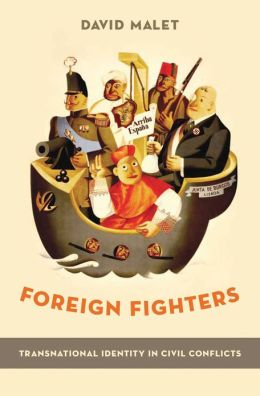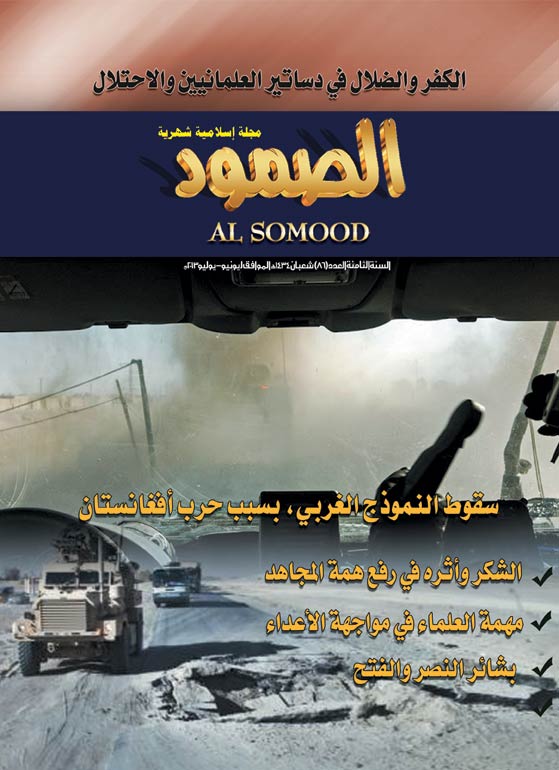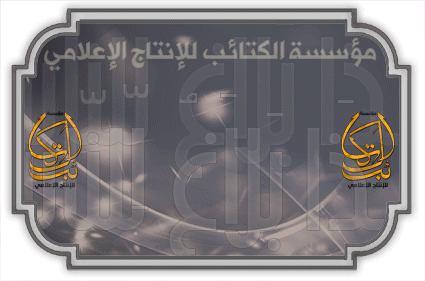NOTE: As with all guest posts, the opinions expressed below are those of the guest author and they do not necessarily represent the views of this blogs administrator and does not at all represent his employer at the Washington Institute for Near East Policy.
Jihadology.net aims to not only provide primary sources for researchers and occasional analysis of them, but also to allow other young and upcoming students as well as established academics or policy wonks to contribute original analysis on issues related to jihadism. If you would like to contribute a piece, please email your idea/post to azelin [at] jihadology [dot] net.
Past Guest Posts:
Hazim Fouad, “Salafi-Jihadists and non-jihadist Salafists in Egypt – A case study about politics and methodology (manhaj),” April 30, 2013.
Daveed Gartenstein-Ross and Tara Vassefi, “Perceptions of the “Arab Spring” Within the Salafi-Jihadi Movement,” November 19, 2012.
Jack Roche, “The Indonesian Jamā’ah Islāmiyyah’s Constitution (PUPJI),” November 14, 2012.
Kévin Jackson, “The Pledge of Allegiance and its Implications,” July 27, 2012.
Behnam Said, “A Brief Look at the History and Power of Anasheed in Jihadist Culture,” May 31, 2012.
Jonah Ondieki and Jake Zenn, “Gaidi Mtaani,” April 24, 2012.
Joshua Foust, “Jihadi Ideology Is Not As Important As We Think,” January 25, 2011.
Charles Cameron, “Hitting the Blind-Spot- A Review of Jean-Pierre Filiu’s “Apocalypse in Islam,” January 24, 2011.
Daveed Gartenstein-Ross, “Why Jihadi Ideology Matters,” January 21, 2011.
Joshua Foust, “Some Inchoate Thoughts on Ideology,” January 19, 2011.
Marissa Allison, “Militants Seize Mecca: Juhaymān al ‘Utaybī and the Siege of the Grand Mosque in Mecca,” June 9, 2010.
—

A Review of David Malet’s Foreign Fighters: Transnational Identity in Civil Conflicts, Oxford University Press, 2013.
By Mark Youngman
In David Malet’s new book, Foreign Fighters: Transnational Identity in Civil Conflicts he seeks to expand discussion of the involvement of foreign nationals in insurgencies beyond the contemporary focus on Islamic extremists and to place transnational jihadists in a broader historical context. Through a rigorous methodology and in-depth case studies, he challenges simplistic explanations for the transnational insurgent phenomenon and identifies a defensive framework common to recruitment messages, regardless of conflict type. Although the methodology employed faces certain challenges, this work succeeds in making a valuable and – given current events in Syria – timely contribution to our understanding of transnational insurgencies.
The Salience of Ethnicity
Out of 331 conflicts contained within two databases that provide the basic data for analysis – the Correlates of War (COW) Instrastate War 1816-1997 and Uppsala-PRIO Intrastate Conflict 1946-2005 databases – Malet identifies 70 involving transnational insurgents. These are coded according to whether the conflict was ethnic or not, and whether the foreign fighters were of the same ethnicity as the insurgent group, creating four conflict types: Diasporans (Type 1: ethnic conflict, coethnic fighters); Liberationists (Type 2: ethnic conflict, non-coethnic fighters); Encroachers (Type 3: nonethnic conflict, coethnic fighters); and True Believers (Type 4: nonethnic conflict, non-coethnic fighters). Four case studies, each representative of one of the types, put the flesh on the bone: the Texas Revolution (1835-36); the Spanish Civil War (1936-1939); the Israeli War of Independence (1947-49); and Afghanistan (1978-1992) and the subsequent activities of transnational jihadists.
Neither Money Nor Martyrdom
Malet challenges the theory that mercenary motives are sufficient for understanding the decision to join, noting that promises of material reward are often not credible and would be undermined by efforts to secure foreign funding. On the contrary, recruiters “typically explicitly inform volunteers prior to their enlistment that their services will bring minimal, nonguaranteed payments.” Nor do Islam, promises of martyrdom, or ethnic kinship offer universal explanations, since “most foreign fighters are secular; they and others have shared neither ties of ethnic kinship nor homeland with the local insurgents they joined.”
Instead, Malet finds that “insurgencies try to recruit foreign fighters by framing distant civil conflicts as posing a dire threat to all members of a transnational community” shared by foreign recruits and insurgents. In other words, recruitment messages utilize a defensive framework, and reframe conflicts as threatening a different group when seeking to expand their appeal. Ethnicity is not the only value uniting recruits and insurgents and, in fact, transnational insurgencies occur most often in nonethnic conflicts. However, recruitment usually occurs via social networks linking these transnational communities, and “potential recruits are generally highly connected to these identity subgroups rather than to their wider national society.” Malet also finds that transnational insurgencies are disproportionately effective, although “it may simply be the case that the best organized and most effective insurgencies were those that also had the capacity to recruit abroad.”
The Challenges of Data
Perhaps the greatest difficulty facing Foreign Fighters is one common to many studies of political violence, and one that the author himself acknowledges: scarcity of data. Information was insufficient to allow for an evaluation of the differences between successful and unsuccessful recruitment campaigns, since failed recruitment efforts are rarely documented. Data quality is not uniform over time, meaning that the involvement of foreign fighters in some conflicts was also likely not documented. And case studies were selected not just for their representativeness, but also for the availability of records.
Other weaknesses are inherent to the methodology: Any attempt to slot social conflicts into tidy categories will fail to capture all the complexities and nuances of those conflicts. Coding conflicts as ethnic or otherwise – when ethnicity can play an important role even in nonethnic conflicts – is just one example. The coding system also does not really allow for the possibility of a conflict itself – rather than its messaging – shifting from one type to another (for example, from Type 2 to Type 4), unless a specific event, such as a change of government, marks the shift. Nevertheless, any classification system would face these difficulties, and almost all are clearly acknowledged by the author himself.
A Solid Foundation
Overall, Foreign Fighters represents a carefully researched and well-caveated study. Current and future conflicts may provide greater opportunity for testing the universality of the defensive framing and for identifying other commonalities and differences in recruitment. The conflict in Syria – which involves transnational insurgents fighting for both sides and for divergent motives – will certainly present an interesting test case. But Malet’s work has provided a solid platform for future debate.
Mark Youngman is a postgraduate studying terrorism at the University of St Andrews, specializing in Russia’s North Caucasus
Month: June 2013
New statement from Shamūkh al-Islām Forum: "Important: Regarding the Recent Events in Bilād al-Shām"

بسم الله الرحمن الرحيم
والصلاة والسلام على النبي الأمين محمد بن عبدالله وعلى آله وصحبه أجمعين ، ثم أما بعد :
لا يخفى على أحدٍ ما يعصفُ بالمجاهدين من فتنٍ وابتلاءاتٍ عظيمة في هذه الفترة الحساسة ، فتنٌ وابتلاءاتٌ عظيمة بحق ، تحتاج منّا لصبرٍ وثباتٍ واحتسابٍ ودعاء،
إنها مرحلة ليست بالجديدة على الموحدين ، بل إن ما يحصل اليوم لهو تأكيدٌ على سنة الابتلاء التي يبتلي الله بها عباده المجاهدين ، ليمحص صفوفهم وينقي أتباعهم ويميز الخبيث من الطيب والصادق من الكاذب ،
هي سحابة نحسبها ستمر بإذن الله ، هذا ظننا بربنا ثم بقادتنا وأمرائنا ، ستزول بعون الله هذه الغُمة وستكشف بإذن الله الكُربة ، وستتوحد بعون الله الصفوف وستتآلف القلوب وستجتمع الجهود وما ذلك على الله بعزيز .
هي مرحلةٌ حساسة وخطيرةٌ ومعقدة بحق ، ونقدر التخبط الذي أصاب الكثير من الإخوة ، ونلتمس لهم الأعذار ، لكن ولأننا أصحاب مسؤولية وقائمين على هذا الثغر الإعلامي علينا توضيح بعض النقاط لإخواننا وأخواتنا الكرام فقد كثر التساؤل عن دور الشبكة في ظل الأحداث الجارية ..
فنقول مستعينين بالله تعالى :..
إن الإخوة وللأسف الشديد انقسموا في ظل هذه الأحداث لثلاث أقسام ، قسم اختار النصرة والصمت والدعاء لقاداتهم وأمرائهم وإخوانهم المجاهدين وكف لسانهم عنهم وترك الطعن واللمز فيهم تورعاً ، وقسم انحاز تماماً للجبهة فصار يعادي ويلمز ويطعن بكل من ناصر الدولة ، وقسم آخر انحاز تماماً للدولة فصار يعادي ويلمز ويطعن بكل من ناصر الجبهة !
وصار كل طرف من الثاني والثالث يحاول فرض رأيه ويلزم الجميع به بل زاد هذا الأمر عن حده حتى باتت تصلنا الطلبات من كل طرف بحذف كل ما يتعلق بالطرف الآخر والله المستعان ..
ونشهد الله أن هذا كان أشد علينا من الخلاف نفسه ، لأننا كما قلنا نثق بأن الله سبحانه لن يضيع عباده وسيهيء لهم من الأسباب ما يجمعهم ويؤلف بين قلوبهم ، لكن ما يخيفنا بحق هو تعامل الأنصار والمتابعين مع هذا الأمر الجلل ، ثم استغلاله ممن باعوا دينهم وأسلموا أنفسهم للشيطان ومن حمل في قلبه على الموحدين حقداً ووجد من هذا الخلاف فرصة للنيل منهم والطعن فيهم ..
نقول أيها الإخوة الكرام بأننا منذ أقمنا هذا الصرح لم نقمه إلا لنصرة المجاهدين والذب عن أعراضهم ، ما أقمنا هذا الصرح إلا لنسدد ونقارب ونجمع ولا نفرق ونوحد ولا نشرذم !
إننا وأمام هذا الحدثوالخطب الجلل نقف بقدر المستطاع موقف الحياد حتى يتم حسم المسألة و تأتينا التوجيهات من أهل الشأن !
وحتى ذلك الحين سنقف بقدر المستطاع على مسافة واحدة من الجميع ونسعى جاهدين لتلطيف الأجواء وعدم السماح لمن يريدون سكب البنزين على النار أن يحققوا أهدافهم ! وكل من يطعن ولو تلميحاً بدولة الإسلام وقادتها أو بجبهة النصرة وقادتها فإنه سيتم إيقافه دون تنبيه مسبق وقد أعذر من أنذر .في رعاكم الله كونوا عوناً لنا ولا تكونوا عوناً علينا ، انصروا إخوانكم وادعوا لهم فلا أقل من الدعاء في هذه الظروف ، أو اصمتوا ولا تخوضوا في أعراضهم ونواياهم ، دعوا خلافاتهم لهم واكتفوا بالدعاء لعل الله يستجيب من أحدكم وما ذلك على الله بعزيز ،
انصروهم ولا تبخلوا عليهم ، فلم يبخلوا عليكم بشيء ، سددوا وقاربوا ، ناصروا ونافحوا ، جمعوا ولا تفرقوا ، لا تتعصبوا لراية أو طائفة ، فمن هم على خلاف اليوم هم إخواننا ولهم حق علينا أن ندعو لهم وننصح بالتي هي أحسن ! .
هذا فإن أصبنا فمن الله وحده وإن أخطأنا فمن أنفسنا والشيطان ، وآخر دعوانا أن الحمد لله رب العالمين .
مع تحيات
إخوانكم في شبكة شموخ الإسلام
_________
To inquire about a translation for this statement for a fee email: [email protected]
The Islamic Emirate of Afghanistan releases Issue #86 of al-Ṣamūd Magazine
NOTE: Previous issues: #85, #84, #83, #82, #81, #80, #79, #78, #77, #76, #75, #74, #73, #72, #71, #70, #69, #68, #67, #66, #65, #64, #63, #62, #61, #60, #59, #58, #57, #56, #53, and #51. You can also see English translations of articles from previous issues here.
—

Click the following link for a safe PDF copy: The Islamic Emirate of Afghanistan — Issue #86 of al-Ṣamūd Magazine
___________
To inquire about a translation for this magazine issue for a fee email: [email protected]
New statement from the Islamic Emirate of Afghanistan: "Regarding the Inauguration of the Political Office in Qatar"

Everyone is aware that the Islamic Emirate of Afghanistan has been waging Jihad and working tirelessly to bring an end to the invasion of Afghanistan and establish in it an independent Islamic government and has always utilized every legitimate method to achieve this goal.
The Islamic Emirate of Afghanistan has both military as well as political objectives which are confined to Afghanistan. The Islamic Emirate does not wish to harm other countries from its soil and neither will it allow others use Afghan soil to pose a threat to the security of other nations! The Islamic Emirate of Afghanistan wants to have cordial relations on basis of mutual respect with all the countries of the world including its neighbors and desires security for its nation as well as security and justice on international level.
Undoubtedly the Islamic Emirate of Afghanistan considers it its religious and national obligation to free its country from occupation and has used every legitimate method for this goal which it will keep on doing in the future. Similarly, it considers the struggle of every oppressed nation working for their due rights and independence to be their legitimate right because every nation deserves to secure freedom from imperialism and attain their rights.
It is due to these objectives that the Islamic Emirate considered it necessary to open a political office in the Islamic country of Qatar for the following reasons:
- 1.To talk and improve relations with the international community through mutual understanding.
- 2. To back such a political and peaceful solution which ends the occupation of Afghanistan, establishes an independent Islamic government and brings true security which is the demand and genuine aspiration of the entire nation.
- 3.To have meetings with Afghans in due appropriate time.
- 4.To establish contact with the United Nations, international and regional organizations and non-governmental institutions.
- 5.To give political statements to the media on the ongoing political situation.
We also thank the government of Qatar and its Emir ‘Sheikh Hamad bin Khalifa Al Thani’ to have agreed with inaugurating the political office of Islamic Emirate and to have made everything easy in this regard.
The Islamic Emirate of Afghanistan
09/08/1434
28/03/1392 18/06/2013
__________
Two new statements from Jabhat al-Nuṣrah

Click the following link for a safe PDF copy: Jabhat al-Nuṣrah — Raid of the Officers Club in the City of Aleppo

Click the following link for a safe PDF copy: Jabhat al-Nuṣrah — Attack on a Farm Where the Army Is Stationed In the Neighborhood of al-Rāshidayn in Aleppo
____________
To inquire about a translation for these statements for a fee email: [email protected]
New video message from Ibn Taymīyyah Center for Media: "Words from the Mujāhidīn in al-Shām About the Injustice of the HAMAS Government To the Salafīs"
UPDATE 6/19/13 1:40 PM: Here is Arabic transcription of the below video message:

Click the following link for a safe PDF copy: Ibn Taymīyyah Center for Media — “Words from the Mujāhidīn in al-Shām About the Injustice of the HAMAS Government To the Salafīs” (Ar)
_____________
—

___________
To inquire about a translation for this video message for a fee email: [email protected]
New statement from Ibn Taymīyyah Center for Media’s Field Monitoring Committee: "Internal Security Continues Arrests: the Son of the Martyr Khālid Banāt (Abū 'Abd Allah al-Sūrī)"

Click the following link for a safe PDF copy: Ibn Taymīyyah Center for Media’s Field Monitoring Committee — “Internal Security Continues Arrests- the Son of the Martyr Khālid Banāt (Abū ‘Abd Allah al-Sūrī)”
___________
To inquire about a translation for this statement for a fee email: [email protected]
Fursān al-Balāgh Media presents a new issue of the magazine: “al-Balāgh Magazine #4"
NOTE: For previous issues see: #3, #2, and #1.
—

Click the following link for a safe PDF copy: al-Balāgh Magazine #4
___________
To inquire about a translation for this magazine issue for a fee email: [email protected]
al-Katāi’b Media presents a new statement from Ḥarakat al-Shabāb al-Mujāhidīn: "This (Message) is a Notification For the People"

Click the following link for a safe PDF copy: Ḥarakat al-Shabāb al-Mujāhidīn — “This (Message) is a Notification For the People”
___________
To inquire about a translation for this statement for a fee email: [email protected]
Five new statements from Jabhat al-Nuṣrah

Click the following link for a safe PDF copy: Jabhat al-Nuṣrah — Targeting Two Groups of Shabīḥah in the Area of Jobar in Damascus With Katyusha Rockets

Click the following link for a safe PDF copy: Jabhat al-Nuṣrah — Raid in the Gharbah Neighborhood Upon the Headquarters of the Shabīḥah and the Rawāfiḍ in al-Sayyīdah Zaynib in Damascus

Click the following link for a safe PDF copy: Jabhat al-Nuṣrah — Report on Some of the Various Military Operations in the City of Damascus (March 2013)

Click the following link for a safe PDF copy: Jabhat al-Nuṣrah — Targeting the Headquarters of the Shabīḥah With Mortars and SPG9 in Damascus

Click the following link for a safe PDF copy: Jabhat al-Nuṣrah — Targeting a Car of the Nuṣayrī Army On the Aleppo-Damascus Road in Rural Ḥamāh
___________
To inquire about a translation for these statements for a fee email: [email protected]
